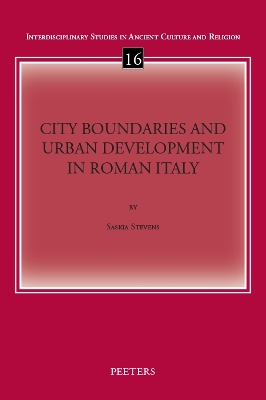Interdisciplinary Studies in Ancient Culture and Religion
1 primary work
Volume 16
In Roman cities, boundaries were an important way of defining spaces.
The significance of such boundaries was mediated by specific cultural
rules. Besides physical boundaries, such as city walls and gates, also
immaterial ones, such as the pomerium, demarcated an urban
context. Certain civic boundaries were highly visible and relevant to
everyone, while others were important to only a small number of people.
This book takes a new approach to Roman urban boundaries and city
planning by exploring the dynamics and interaction between urban
development processes, city limits and the law. As a result, Roman
attitudes towards the symbolic meanings of civic boundaries can be
better understood. Not only landownership influenced and determined the
use of urban space and its boundaries; also conflicts and constant
negotiations between law, culture and tradition, politics, and the
dynamics of everyday urban life were important for the way the Romans
approached urban limits.
The significance of such boundaries was mediated by specific cultural
rules. Besides physical boundaries, such as city walls and gates, also
immaterial ones, such as the pomerium, demarcated an urban
context. Certain civic boundaries were highly visible and relevant to
everyone, while others were important to only a small number of people.
This book takes a new approach to Roman urban boundaries and city
planning by exploring the dynamics and interaction between urban
development processes, city limits and the law. As a result, Roman
attitudes towards the symbolic meanings of civic boundaries can be
better understood. Not only landownership influenced and determined the
use of urban space and its boundaries; also conflicts and constant
negotiations between law, culture and tradition, politics, and the
dynamics of everyday urban life were important for the way the Romans
approached urban limits.
